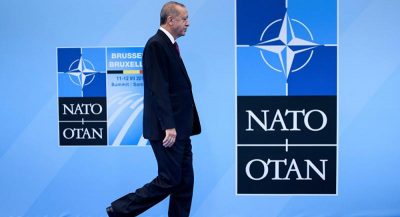Syria was the very reason why relations between Turkey and the United States deteriorated as the latter openly backed the Syrian branch of the Kurdistan Workers Party, known as the People’s Protection Units (YPG), that Ankara considers a terrorist organization. Although Turkey has always been a loyal ally and member of the U.S.-led NATO, the Syrian War saw relations between Ankara and Moscow flourish despite an initial speedbump when Turkey downed a Russian jet in Syria in 2015, leading to the murder of the pilot by Turkish-backed terrorists. Russia not only improved relations by selling Turkey the powerful S-400 missile defense system, but sympathized with Turkish concerns against the YPG and partnered with Turkey in Syria-related discussions through the Astana and Sochi formats. The S-400 sale triggered the wrath of NATO, and many within the political establishment in Washington considered the option of kicking Turkey out of the Atlanticist organization.
It appeared that with Russo-Turkish relations strengthening, Turkey would join the new Multipolar World System. However, at the end of January, Turkish
President Recep Tayyip Erdoğan had an outburst against Russia, revealing his frustration by stating “Russia is not abiding by Astana or Sochi” as Moscow refused to discourage their Syrian allies from fighting Turkish-backed terrorist forces operating in Idlib province in Syria’s northwest. However, the Astana and Sochi agreements allow for operations against terrorist organizations – the Syrian Army are battling against Al-Qaeda affiliated formations like the Turkestan Islamic Party and Hayat Tahrir al-Sham.
With Russia refusing to step away from backing its Syrian ally, Turkey has escalated the situation in Idlib by mobilizing thousands of soldiers to illegally occupy large swathes of the province. NATO Secretary General Jens Stoltenberg wasted no time and during a press discussion yesterday after the first day’s session of the Meeting of NATO Defense Ministers, he announced that NATO is giving support to Turkey against Syria in Idlib. This came when on the same day U.S. Special Representative for Syria, James Jeffrey said in an interview with the Turkish news channel NTV that Turkish soldiers that are currently stationed in Idlib have the right to defend themselves and that Washington and Ankara have a common geostrategic goal in Syria and Libya.
Effectively, as Russia and Turkey find huge differences in not only Idlib, but also in Libya, both NATO and the U.S. have pounced at the opportunity to bring Turkey firmly back into its camp and away from Russia – Ankara has been more than happy to oblige. As Turkey occupies a strategic space in Eurasia, serving as the bridge between East and West, while also controlling the Bosporus and Dardanelles, the straits where Turkey holds huge leverage against the Great Powers.
There is little doubt that the Syrian Army’s offensive in Idlib has
deepened the rift between Russia and Turkey, so-much-so that Erdoğan, emboldened by support from Stoltenberg and Jeffrey, claimed that “most of the attacks carried out by the [Syrian] regime and Russia in Idlib target civilians rather than terrorists.” Of course, he had no evidence to back this claim and Kremlin spokesman Dmitry Peskov denied the charge.
Ankara claims that it is deeply concerned by the danger posed by a new wave of refugees and its concerns for Syrian civilians in Idlib. However, the de facto currency of Idlib is no longer the Syrian pound, but rather the Turkish lira. This is in conjunctions to the installation of Turkish communication systems in the province, duty free Turkish goods flooding in and Syrian industry dismantled and taken into Turkey. These actions would suggest that Turkey is planning to permanently control the region. Syrians remember when its Hatay province was stolen by Turkey in 1939 and also remember when the northern portion of maritime neighbor Cyprus was invaded by Turkey in 1974. In the minds of Syrians, a permanent Turkish occupation of Idlib is not an exaggeration as many officials in Ankara openly proclaim their dreams for a
neo-Ottoman Empire and a Syrian jihadist leader even
said on Turkish television that the so-called Free Syrian Army will fight “wherever jihad is” and for the “Ottoman Caliphate.”
As Turkey has been insubordinate to NATO over the YPG issue and strengthened relations in Russia as a reaction, both NATO and the U.S. have jumped at the opportunity to bring Ankara out of Moscow’s orbit. This was an inevitable result as Russia would not abandon its Syrian ally or accept a permanent occupation. Syrian President Bashar al-Assad vowed in 2016 that “every inch of Syria” would be liberated, and Moscow has always supported the notion that full Syrian sovereignty must be restored and the country not Balkanized. As Turkey’s long-term goal to replace Assad with a Muslim Brotherhood and Turkish-sympathetic leader has failed, it is likely that the occupation of Idlib is Plan B as a consolation prize towards the neo-Ottoman Empire project. As Washington desperately wants Erdoğan back within its sphere of influence, it is willing to allow Turkey to occupy Idlib and perhaps even annex the region. As NATO and Washington have given their blessing for Erdoğan to military engage in Idlib, something that Russia has condemned, there is little doubt that the Idlib crisis has put Turkey firmly back into the NATO sphere and away from Russia.
*
Note to readers: please click the share buttons above or below. Forward this article to your email lists. Crosspost on your blog site, internet forums. etc.
This article was originally published on InfoBrics.
Paul Antonopoulos is a Research Fellow at the Center for Syncretic Studies.
The original source of this article is Global Research


No comments:
Post a Comment